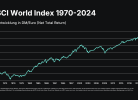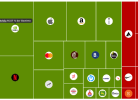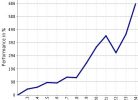Heute gibt es für euch einen Beitrag von Mitch Zacks (Zacks Investment): Was wird die nächste Krise verursachen?
Ja, das wüssten wir alle gerne. Aber vielleicht ist das auch ganz egal. Fest steht, dass sie kommen wird. Und dass wir versuchen sollten, mitten in der Krise Aktien zu kaufen (wenn unsere Nerven das zulassen).
Ich hoffe ganz sehr, dass Warren Buffett dann noch unter uns ist und mutig voran geht. Und dass er dadurch unsere Nerven beruhigt. Leider ist Buffett schon 88 Jahre als (er hatte gestern Geburtstag – Glückwunsch Warren!).
Möglicherweise wird er in der nächsten Krise also nicht mehr unter uns sein und wir müssen selber denken. Ist vielleicht auch besser so. Wir haben ja auch einen Verstand.
What Will Cause the Next Market Crisis?
– by Mitch Zacks –
The next big market crisis will be caused by…
The short answer, unfortunately, is that no one can say for sure. But, we do have insight and a strong opinion about what will not cause the next crisis: toxic subprime loans and over-leveraged banks, whose downfall ultimately brought global financial system to its knees in 2008.
The reason we’re confident the next crisis will be caused by something other than toxic loans and a credit crunch is because history has repeatedly shown us that the causes of ‚the next crisis‘ are almost never closely related to the causes of the ‚previous crisis.‘ This ultimately makes sense, since investors and policy makers tend to respond to a crisis by implementing guardrails (laws and rules) and by putting new lines of defense in place in order to avoid a repeat catastrophe.
Examples from History: The Global Financial Crisis and the Dot Com Bubble
Dodd-Frank was the government’s legislative response to the 2008 global financial crisis, which among other things requires the country’s 35 largest banks to undergo annual „stress tests“ to measure if they have sufficient capital to survive the combination of a recession, depressed housing prices, and double-digit unemployment.
Because of the new rules, banks are now required to have a minimum key capital ratio of 4.5%, they’ve added over $800 billion to balance sheets since 2008, and the Volcker Rule bars them from trading with depositor’s money.
In other words, a great amount of effort has been made to ensure the next crisis doesn’t happen for the same reason as the last one.
This cycle is fairly predictable, in my view: policy-makers and investors tend to respond to crises by over-compensating with too much regulation or, in the case of investors, over-allocating away from the troubled sector in the wake of the downturn. This over-compensation, in my view, is what prevents crises from repeating themselves from cycle to cycle.
After 2008, I think it is safe to say that many investors not only sold out of stocks altogether, but many also shunned banks and financial stocks in portfolios. Both reactions would have been errors, in my view. In addition to missing out on the diversification benefits of investing in a sector as huge and critical as Financials, there are also the returns to consider: from April 2009 (end of the crisis) through July 2018, both Financials (as measured by XLF) and the S&P 500 are up approximately +230%. As I see it, avoiding Financials after the crisis would not have been beneficial to the investor.
If we go back one crisis to the 2000 tech bubble, we recall that it was caused by completely different factors as the global financial crisis. In the tech bubble, euphoric investment sentiment drove up the P/E ratios of dot coms into the hundreds, even as many companies had no positive cash flow or signs of being able to generate it. We know today that it would have been a mistake to abandon solid technology companies in portfolios following the bubble, as technology stocks (as measured by XLK) actually outperformed the S&P 500 from October 2002 (when that bear ended) to October 2008 (when the new bear took hold).
We could continue to go back in history and find different crises, different causes. The mini 1997 Asian Financial contagion was related to Emerging Market debt and the collapse of a currency (Thai baht); the crisis before that in 1990 was arguably tied to Iraq’s invasion of Kuwait and the subsequent spike in oil prices. And so on down the line of history.
Bottom Line for Investors
We can’t say for sure where the next crisis will come from, but we’re pretty confident about what we can rule out. In other words, if you’re looking to big banks or trouble in the financial sector for the bogeyman that will break this bull, you’re probably looking in the wrong place.
Indeed, crises often emerge from factors, places or risks that investors don’t see, or ones they are just plain ignoring because there is too much focus on returns. The good news is that we do not see any such factors or risks looming imminently today, and we know where to keep looking for them – in places no one else is talking about.
To help you do the same, I would like to offer you an exclusive look into our September Stock Market Outlook Report. This report will give you a deeper look into the stock market, various factors affecting it and what you can expect as 2019 approaches. I invite you to download our just-released September 2018 Stock Market Outlook Report >>
This Special Report is packed with newly revised predictions that can help you base your next investment move on hard data. For example, you’ll discover Zacks‘ view on:
• Which sectors are hot…and which are not
• 2018 end of year forecast for the S&P 500
• Why global oil prices are rising again
• Small cap vs. large cap returns
• Our view on the odds for a recession
• And much more…








Übersetzung für die älteren ab „Bottom Line for Investors“ (Zusammenfassung für Investoren):
„Wir können nicht mit Sicherheit sagen aus welcher Ecke der nächste Crash kommt, aber wir sind ziemlich zuversichtlich, manches ausschließen zu können. In anderen Worten, wenn du auf die großen Banken oder den Finanzsektor als Buhmann schaust, der dem Bullenmarkt das Genick bricht, dann schaust du wahrscheinlich auf das Falsche.
Tatsächlich entstehen Krisen meist aus Faktoren, an Plätzen und aufgrund von Risiken, die die Investoren nicht sehen oder die sie komplett ignorieren, weil sie sich zuvor auf die Profite konzentrieren. Die gute Nachricht lautet, dass wir keine solchen Risiken oder Fakten sehen, die sich heute drohend auftürmen, und dass wir wissen wo wir heute hinschauen sollten – dort wo keiner sonst hinschaut.“
Um den Investoren zu helfen, bieten sie dann noch einen Blick in einen exclusiven Report an…
Hoffe ich konnte etwas helfen.
Gruß Tugumak
Danke!
Wer sagt dir denn, WIE die nächste Krise ablaufen wird? Mitten in einem, in dem Umfang noch nie da gewesenen Gelddruck-Experiment, der nie da gewesenen Verschuldung von Staaten und Unternehmen, die ohne Niedrigzinsen längst pleite gegangen wären. Es gibt jede Menge Hinweise, daß die nächste Krise nicht eine Krise sein wird, in der man einfach Aktien kauft und alles ist gut. Wie man sein Vermögen erhalten wird, weiß ich nicht, aber nur aussitzen(wenn man nicht mehr zwanzig ist) und zukaufen, wird diesmal nicht reichen. Wenn man nicht alles verlieren will, wird man das neuronale Netzwerk zwischen den Schultern ziemlich anstrengen müssen.
Eine Krise läuft immer verschieden ab, aber ich denke die Auswirkungen sind immer wieder die gleichen. Sehr, sehr viele versuchen ihre Anlagen zu Cash zu machen, weil in der Krise Cash King ist.
Also alles raus – zu welchen Preisen auch immer, damit ich flüssig bleibe, meine Schulden, meine Arbeiter/Angestellten, sonstigen Verpflichtungen zahlen kann.
Da heißt es eher das „neuronale Netzwerk zwischen den Schultern“ nicht so anstrengen, sondern Nerven behalten…
buy and hold betreiben und immer wieder stur nachkaufen, das ist die eine Möglichkeit. So machts Tim Schäfer…
Oder (aber das können nur die wenigsten) verkaufen, hoffen dass es noch weiter sinkt und dann seine Ängste überwinden und wieder voll rein, wenn die Kurse am Tiefpunkt sind.
Aber Ängste zu überwinden, wenn alle und alles nur noch die Offenbarung des Johannes prophezeien ist recht schwer…da kann Christian Thiel eher was dazu schreiben 😉
Alles war in Englisch, daher habe ich leider nichts verstanden.
Ich denke, anderen Lesern wird es ähnlich gehen.
Bitte ein wenig Rücksichtnahme auf ältere Leser.
Das tut mir leid. Viele können das ohne Probleme verstehen – und für die steht es hier. Also bitte ein wenig Rücksichtnahme auf jüngere Leserinnen und Leser.
Ganz schön überheblich!
Ziemlich forsch geantwortet. Nicht nett, nicht professionell.